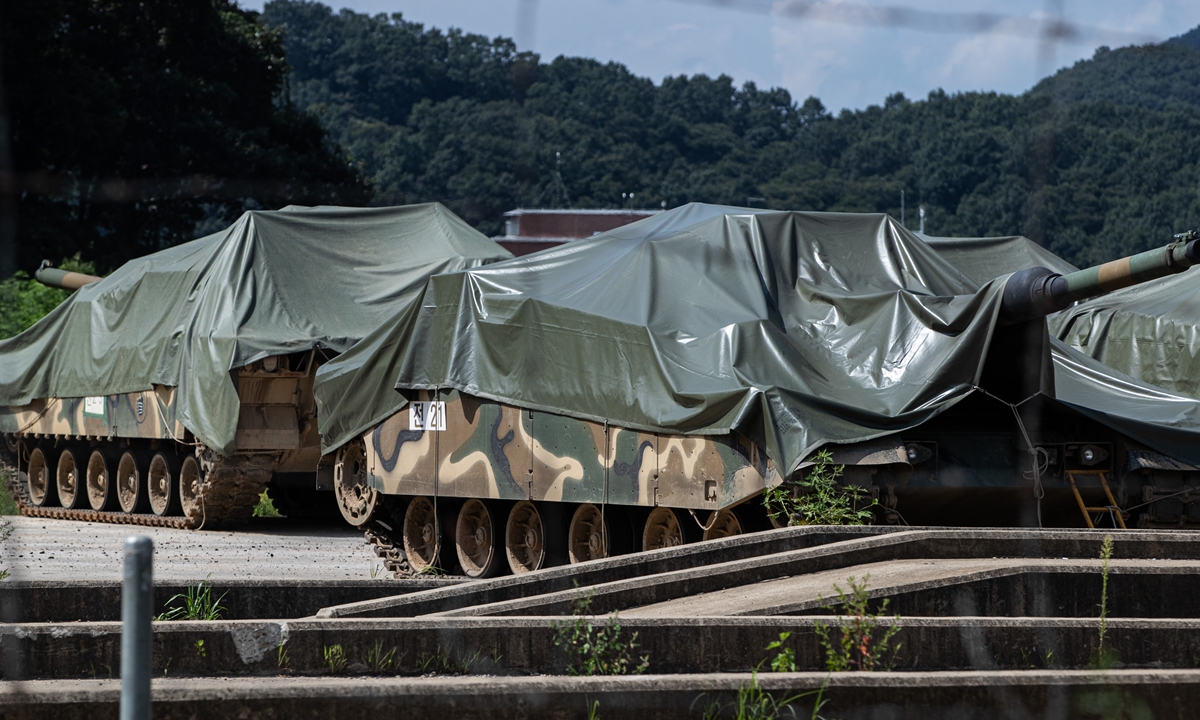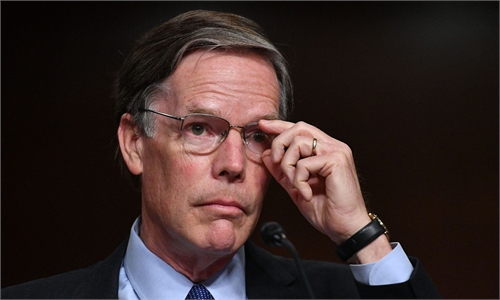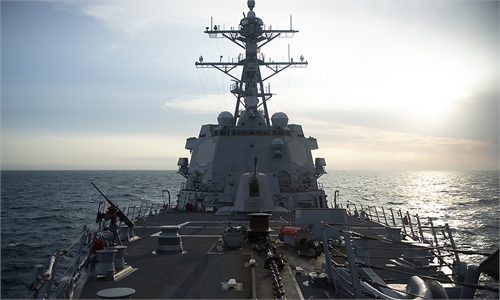Concerns over escalating tensions in Asia-Pacific intensified as US, S.Korea to begin biggest military drills in years

Some tanks park in Paju, South Korea, on August 21, 2022, one day before the US and South Korea are scheduled to begin the Ulchi Freedom Shield drills from August 22 to September 1 in South Korea. Photo: VCG
As Washington is seeking to bolster strategic ties with one of its closest Asian allies, the US and South Korea will begin their biggest combined military exercise in four years from Monday as tensions in the Korean Peninsula escalate. Chinese observers warned the exercise would raise tensions in the peninsula and wider Asia, and regional countries including China would be on high alert.
The allies' summertime drills - Ulchi Freedom Shield (UFS) - which is nominally defensive as it has been annually staged, will take place from Monday to September 1 in South Korea, AP reported.
The report noted that the drills will underscore Washington and Seoul's commitment to restore large-scale training exercises after they canceled some of their regular drills and downsized others to computer simulations in recent years to create space for diplomacy with North Korea and because of COVID-19 concerns.
According to media reports, the drills will involve tens of thousands of troops in live-fire exercises combining land, sea and air forces. The maneuvers are set to include joint mock attacks, reinforcement of frontline units and simulations involving the securing of weapons of mass destruction.
Units will also practice using drones for surveillance and a number of new developments in warfare that have emerged amid the Russia-Ukraine conflict, a South Korean Defense Ministry official told reporters in Seoul.
North Korea has denounced the exercise as a dress rehearsal for northward invasion, the Xinhua News Agency reported on August 16.
As China-US ties have become more confrontational, especially after US house speaker Nancy Pelosi paid a provocative visit to the island of Taiwan on August 2 despite China's strong opposition, this joint military exercise led by the US has more meanings and purpose - not only aimed at North Korea, but also to flex the US' muscle in the Asia-Pacific region and to demonstrate its military presence in the region and to deter China, Lü Chao, an expert on the Korean Peninsula issue at the Liaoning Academy of Social Sciences, told the Global Times on Sunday.
During the drills, the US is likely to deploy more strategic weapons, such as aircraft carriers and strategic bombers, Lü predicted, noting that China needs to be vigilant on this amid mounting tensions in the Taiwan Straits.
The military drills would escalate tensions in the Korean Peninsula, which have always been regarded as a "powder keg" in the Asia-Pacific region, and the development of the situation in the peninsula would affect the peace and stability of Northeast Asia and even all of Asia, Lü warned.
If chaos breaks out on the Korean Peninsula, it will also pose a threat to China's national security. China will not sit idly by, Song Zhongping, a Chinese military expert and TV commentator, told the Global Times.
Also, the drills will inevitably attract the attention of Japan, and the possibility that Japan will be involved in the military exercises between the US and South Korea in the future could not be ruled out, Song said. The US is making efforts in building a trilateral military alliance, the military expert warned.
The US Department of Defense said the US, South Korean and Japanese navies took part in missile warning and ballistic missile search and tracking exercises off the coast of Hawaii from August 8 to 14, which it said was aimed at furthering trilateral cooperation "in face of North Korean challenges," according to the AP report on August 16.
Observers pointed out that Seoul is in a contradictory state. On the one hand, the South Korea-US military exercises are led by the US military and have to be carried out, and South Korea also makes a gesture of full cooperation in the drills. On the other hand, both the authorities and the people in South Korea are deeply concerned about a situation that could lead to an escalation of tensions on the Korean Peninsula.
In protest against the planned South Korea-US war games, thousands of liberal activists gathered in central Seoul on August 13 in advance of the Liberation Day on August 15 to celebrate the 77th anniversary of the Korean Peninsula's liberation from the Imperial Japan's 1910-45 colonial rule, Xinhua reported.
The administration of South Korean President Yoon Suk-yeol has been making efforts to strike a balance between the major powers, but the overall trend of its diplomacy appears to be further enhancing the South Korea-US alliance, some observers said.
Tying itself to the US' Indo-Pacific Strategy is clearly not in line with the realistic interests of South Korea, despite Washington ramping up its coercive efforts to push the country to "take sides" and trying to expand NATO to the Asian region, experts noted.




